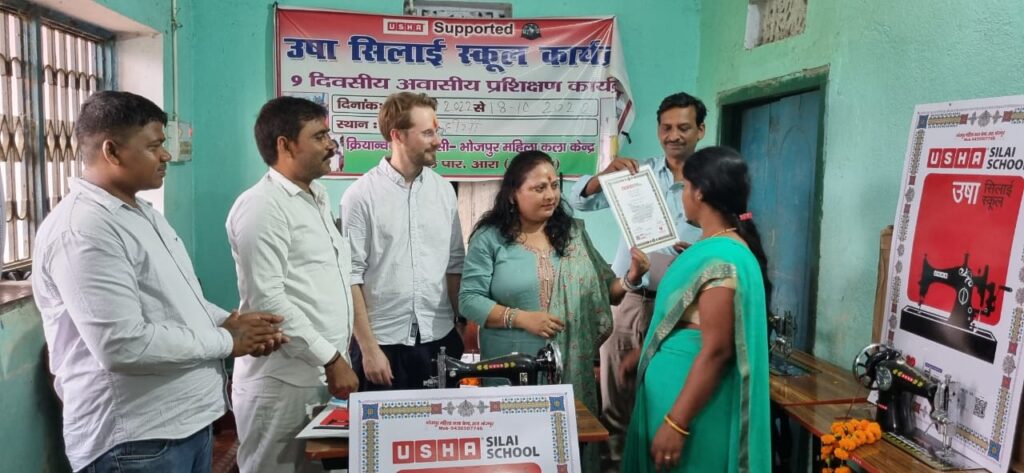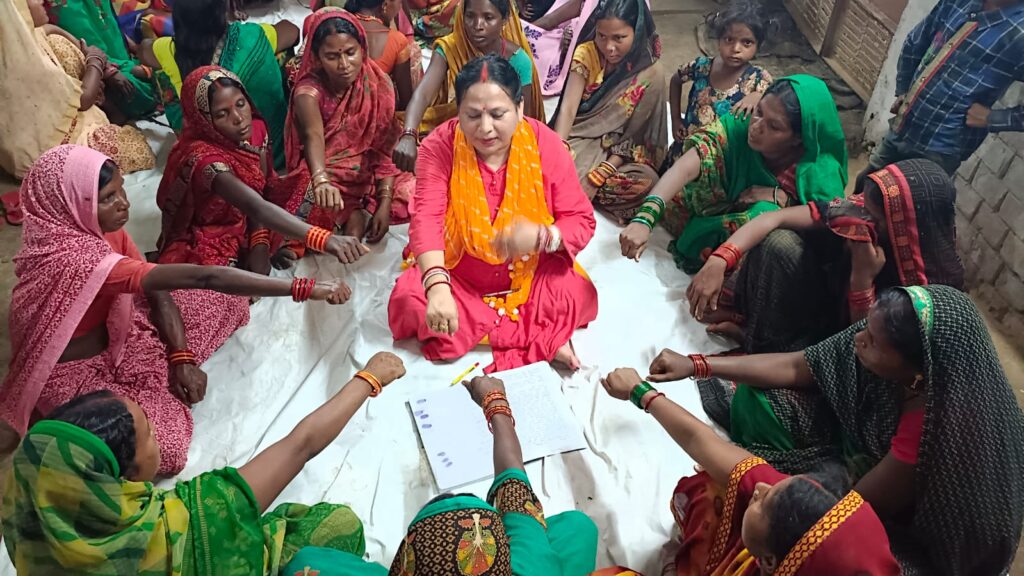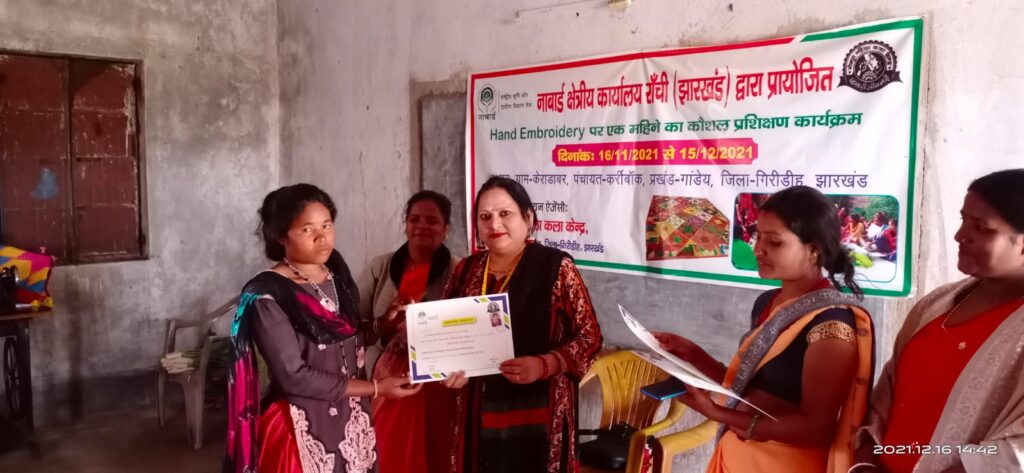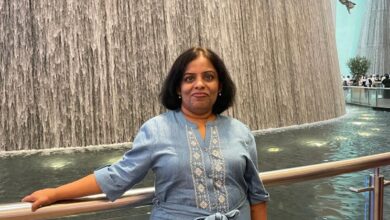This woman from Bihar stood up to the patriarchy, became a successful social entrepreneur, and empowered over 1 Lakh marginalized women

Women have been at the mercy of a patriarchal society since ancient times. Our history is proof of an uneven and unequal world where men have always had the upper hand. We live in a world of forgotten daughters and traumatized women who for way too long have suffered at the hands of our society. Women have had to fight and earn fundamental human rights over the years for their survival and betterment. Even today, in 2022, the fight for equal pay and equal work opportunities continues. Many women, time and again have proven their mettle, fought for their rights, and paved a way for many more. Change takes time but the relentless efforts of these bold women have changed the course of history innumerable times.
One such changemaker is Anita Sharma, founder of Bhojpur Mahila Kala Kendra (BMKK). She didn’t let the men in her life write her destiny and is teaching and helping every woman she can to be independent. She believes in the power of education, hard work, and a strong will to stop at nothing until you have achieved your dreams.
Read on to find out how did she break free from the shackles of an abusive household, and built a life for herself and many others?
Early Life
Anita was born into an affluent family located in a small village called Arrah in Bihar. She lived in a joint family and has 6 sisters and a younger brother. She lost her father at the age of 6 and her life was never the same. Even though she was from a rich family, her mother and all the kids were treated poorly, abused, and ignored. Her mother was a simple woman who wasn’t educated. She had nothing to her name and post her husband’s demise was left at the mercy of the men of the family. She was given only Rs.100-500 for monthly expenses which weren’t enough to feed her kids and pay for their education. Anita was too small to understand at the time the reason behind all the mistreatment but as she grew up it became evident to her. She wondered how different their lives would be if only her mother was educated and self-reliant.
As a kid, Anita and her mother and siblings visited her maternal grandfather’s house often. There she saw another ugly face of patriarchy. Her grandfather’s sons had all passed away at an early age. To continue his lineage, he purchased a young girl from the village to bear his children and look after the cleaning and maintenance of the house. She used to live in a small hut inside the house and was treated like a maid. Whenever she bore girls, they were left with her in the small room and forgotten. Whenever she gave birth to boys, they were immediately separated and brought into the house by the grandfather. She used to often steal food from the kitchen and small knick-knacks from the house. On one unfortunate day, she was caught stealing food and received a harsh beating from her grandfather. He hit her with utensils and broke her finger, leaving her bleeding and crying in her room.
Anita was 8-10 years old at the time of this incident and could not bear to see her condition. She bandaged her up and realized the only reason she was living under such inhuman conditions is that she was uneducated. Had she learned some skills, she would have been able to earn her keep and live respectfully. It was then Anita made up her mind to study and lead an independent life. She knew what not having a father meant for her future and didn’t want to end up like the poor girl in her grandfather’s house. The biggest challenge was how to earn enough money for education as she had no financial help from her family.
Light at the end of the tunnel
Anita had a hobby of making small toys which caught the attention of other women in the village. Whenever Anita’s relatives visited, she used to receive a small amount of money from them which she used to buy raw materials for her toys. Soon other women started learning from her and she taught them for free. At the age of 14 years, Anita decided to start a small class out of her house where she would teach women stitching for a small fee of Rs.25/-. This money was earmarked for her education and her siblings. In the year 1993, she started her class called Bhojpur Mahila Kala Kendra (BMKK) and put up a banner in front of her house. This wasn’t well-received by her family and her uncles started threatening her.
They ordered her to shut down the classes as it was hampering their reputation and status. Anita agreed to shut down only if they were willing to pay for her education. They laughed in her face and told her that earning money for education was futile as the only future she could have was an early marriage. Anita didn’t give in to their demands and continued irrespective of all the hurdles and troubles her family created for her. Looking at her unwavering determination, her nephew threw her banner into the Holi bonfire. To his disbelief, it only made Anita stronger. She printed new banners and overcame every obstacle the family put in her way.
She didn’t back down when threatened to be physically abused rather stood up to the family and achieved her goals.
Agar tum maroge, toh hum bhi maarenge. Padhai ka paisa de doge toh class band kar denge.
It wasn’t easy for women to step out and go learn from Anita either. At the time it wasn’t acceptable for women to go out for education. With all her efforts and support from fellow women, Anita continued her classes and established a group of 100 students from neighboring villages.

Government Recognition
Anita decided to double down on her efforts and reach out to more women in need. She received support and help from many government schemes. By forming groups of 15 women, Anita got together 300 rural and poverty-stricken women and helped them under different government initiatives like SGSY Yojna, DRDA Scheme, and many more. She gave them an invaluable gift of education and a chance at a better life. She also earned small amounts of money in exchange for the training which gave her the means and confidence to keep going.
Although these women were learning the necessary skills, it wasn’t enough for them to land jobs and compete for employment. To battle this issue, Anita thought of providing them with some recognition in the form of certificates but at this time her N.G.O. wasn’t registered. Anita along with her brother Santosh approached some friends and government officials like the then Secretary General of Bihar to get registration. In the year 2000, she registered her N.G.O. under the Societies Registration Act 21/1860 and Foreign Contribution Regulation Act, 1976 in the year 2002 and under sections 12 A & 80G of the income tax Act. Anita popularised and marketed this recognition to attract and help more women.

Extending a helping hand
Anita realized that she was able to earn well and run her N.G.O. successfully with that money. She now felt the need to work towards the upliftment of harassed, differently-abled, and marginalized women who didn’t have homes or families to take care of them. She started visiting small villages and started providing handicraft training to these women, absolutely free of cost. She has trained 1,00,000 + women and has provided employment to more than 10,000 women who would otherwise be forgotten and tormented. BMKK targeted women from O.B.C. and other minority categories from the year 1993-2015 and worked relentlessly for their upliftment who now have recognition in society and are able to earn their keep.
Moving forward the N.G.O. has been targeting the Musahar community of Bihar. This particular community is amongst the poorest Dalit communities who have been plucked out of society and left to survive on their own. They are deprived of basic human rights, hygiene, housing, nutrition, and education. BMKK has been working for their upliftment for the past few years to educate them and provide employment and a respectable place in society. Each village has min 150-200 population of Musahar Dalits who reside at the outer border of the villages and are cut off from society. They are subjected to untouchability even in the year 2022.
BMKK brought about change in society bringing all the communities and people from various casts and religions under one roof to educate and train the Musahar Dalits. Here they are free from discrimination and for the first time in their lives feel respected and seen.

The Change
Women who are associated with BMKK and work as trainers are able to earn well for themselves. They might not be educated but they know their trade, participate in fairs all over the country and sell their products. They also train others and earn up to Rs.1,000 per session. Because of the hard work of these women, some of them have been featured in short movies highlighting their journeys and achievements. Anita has been lauded with many prestigious awards.
- Received“Brand of India Award” as SME by Hon. MSME Minister Sri Giriraj Singh, Ministry of MSME, Govt. of India in 2019. “JIJABAI” award from Shivaji Collage (Delhi University), New Delhi in January 2020 for Women empowerment.
Awarded “STATE AWARDEE” Artisan in Artificial Jewelry to Ms. Anita Gupta, Secretary, BMKK in Bihar.
1st Prize from CAPART for women entrepreneur in National Label Gram Shree Mela in Ranchi, Jharkhand
1st Prize from Women Development Corporation Patna, for Best Stall in Sri Shakti Mela in Patna, Bihar
“Women on a Mission” award presented by Mrs. Sudha Murthy founder of Infosys foundation and Padamshiri by “Your Story” India’s leading media platform for startups and entrepreneurs.
Anita has come a long way since she commenced teaching and uplifting the women of Bihar. She used to dream of owning 1 sewing machine initially and now she gives away 500+ machines to women in need for free. Her will and determination to empower women have been the key to success. Her family which made it almost impossible for her to survive and earn money is now living on with Anita’s help. She believes in divine judgment and holds no grudges against anyone who wronged her. She encourages everyone to come together and help marginalized communities for a better tomorrow.






2 Comments